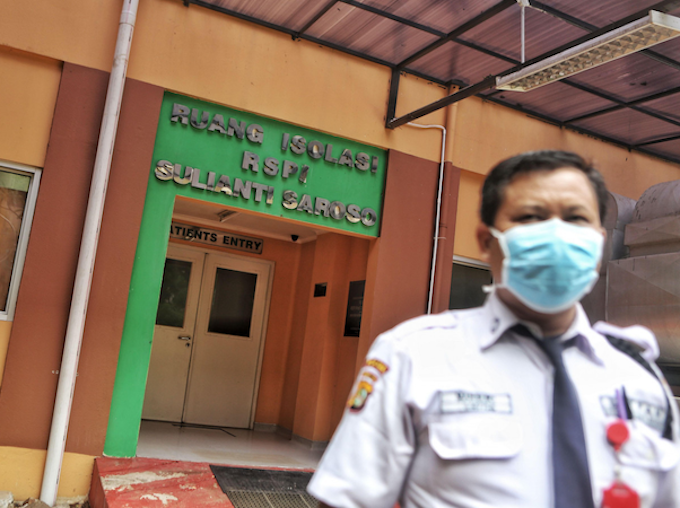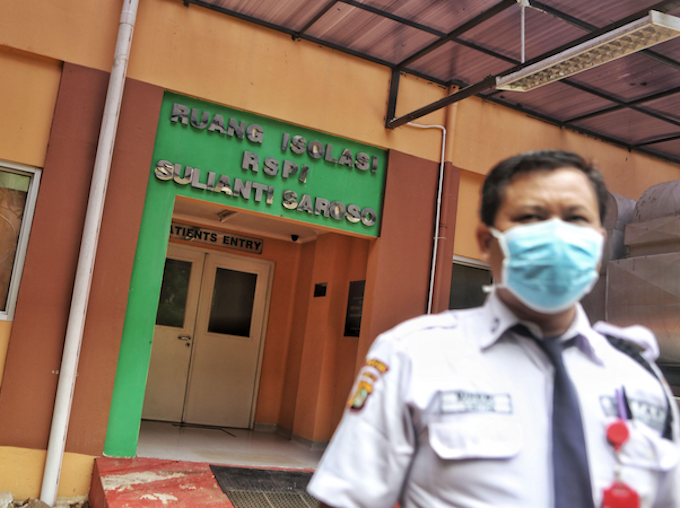
By Ardilla Syakriah, Rizki Fachriansyah and Muh. Ibnu Aqil in Jakarta
Indonesia’s first two confirmed Covid-19 coronavirus patients claim that media coverage and discussion on social media have taken a greater toll on them than the disease itself, saying that numerous breaches of privacy and the resulting stigma have left them “mentally drained”.
Some people went so far as to directly attack one of the patients, known as Case 1, through social media.
A message saying “You have been warned by the government to be vigilant of foreigners but you were stubborn” was sent to her over Instagram, a screenshot of which was shown to The Jakarta Post on Wednesday.
READ MORE: Indonesia to test more people for the Covid-19 virus
Earlier, personal details of the two patients comprising their initials, ages and home address popped up on WhatsApp groups and other social media from an unclear source not long after the news about the confirmed cases broke on Monday.
President Joko “Jokowi” Widodo announced that a 31-year-old woman (Case 1) and her 64-year-old mother (Case 2), both residents of Depok, West Java, had tested positive for Covid-19 after coming into contact with a Japanese woman who later tested positive in Malaysia.
– Partner –
The President’s announcement came as a surprise to the patients themselves.
“We had not been [officially told that we had tested positive],” Case 2 told kompas.com on Tuesday.
Patients’ house swarmed
Ever since the announcement, reporters have swarmed the patients’ house. In social media, photographs of the patients also spread like wildfire.
Some internet users questioned the younger patient’s profession, correlating it with how she might have contracted the virus.
Health Minister Terawan Agus Putranto said on Monday that Case 1 was a dance teacher and had danced with the Japanese citizen, whom he described as a close friend of the woman, in a club in Kemang, South Jakarta.
In a statement made on Wednesday, Case 1 shared how she might have contracted the virus and what she did afterward — which differed from the account released by the authorities.
Case 1 said she had started coughing and having a fever on Feb. 16 and decided to visit a private hospital along with her mother last Thursday. There, she was diagnosed with bronchopneumonia and her mother with typhus.
The following day, a friend in Malaysia called to let her know a Japanese woman who had tested positive for Covid-19 on Feb. 26 had visited the restaurant in Jakarta where she had been hosting on Feb. 15.
“For the sake of national security and health, I informed the doctor that I needed to be tested and that’s why I’ve been isolated since Sunday. I don’t even know nor am I acquainted with the Japanese citizen,” she said.
Japanese citizen a woman
She further emphasised the Japanese citizen was a woman, not a man who “rented” her like the gossip said. “I was just in a room with the Japanese woman without knowing who she was.”
“Please respect me and my family’s privacy, stop spreading our photos and fake news about us,” she said in a statement.
The breach of the patients’ personal data also affected their neighbours. Anis Hidayah of Migrant Care, one of the neighbours, said media coverage had disrupted their activities: some were not allowed by their employers to work and app-based motorcycle taxi drivers were adamant about not accepting orders from the housing complex.
“What I regret the most is it has framed people I know personally in unfavorable ways,” Hidayah said.
Institute for Policy Research and Advocacy researcher Wahyudi Djafar said the recent case of privacy breach was due to the absence of legislation on personal data protection and the lack of respect for privacy in society.
Unlike Singapore with its 2012 Data Protection Act, Indonesia has no specific law stipulating what makes data private, the rights of data owners, the duties of the data processors, or the mechanisms for processing such data.
“Even if some laws regulate about privacy, the material is limited and often contradictory because they don’t follow the same principle of personal data protection,” he said.
Data protection bill
He urged that a data protection bill be discussed, although he warned the public to keep an eye on the deliberations as there was potential for abuse of power in the current draft. The draft only imposes administrative sanctions on the government for possible wrongdoing.
Jokowi requested people respect the Covid-19 patients’ privacy following his announcement. He also asked that his ministers and the hospitals involved in treating the patients avoid disclosing the patients’ private information.
In a statement issued on Monday, the Alliance of Independent Journalists (AJI) called on members of the press to be more considerate in their reporting by speaking to the most credible sources on the issue, as opposed to publishing “sensationalised” pieces on the patients and their families.
Lawmaker Charles Honoris has urged the government to ensure the privacy of its citizens in relation to the spread of the coronavirus.
“Mass disclosure of Covid-19 patients’ private information should be taken seriously as a violation of citizens’ privacy,” he said.
He said the government must learn from Singapore and Japan in this regard, specifically about how the two countries had implemented a zero-tolerance privacy policy to protect the personal lives of its confirmed Covid-19 patients.
The writers are staff reporters of The Jakarta Post.
Article by AsiaPacificReport.nz






